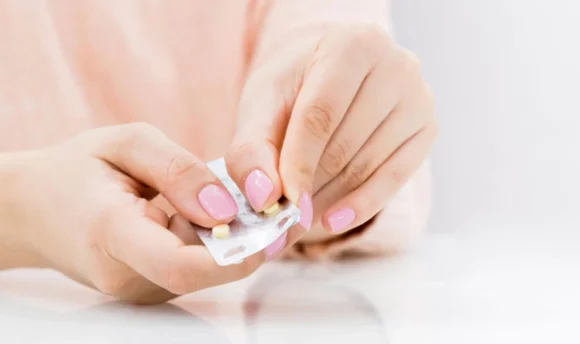Why Do I Gain Weight When I Eat Less? Facts You Should Know
It might be tempting to cut healthy calories out of your diet, especially if you struggle to lose weight. But will this trigger bad side effects? Can food restriction actually make you gain a few pounds? We explain if eating less contributes to weight gain and why this might happen.

Reaching a weight loss plateau can be super defeating.
You don’t know what else to do, so you cut down on calories. This is a bad choice that may lead to many health risks on your fitness journey. Eating less can actually disrupt your weight loss progress completely, which is why you should learn about the recommended food intake.
The human body needs food to function properly, especially during intense workouts. But what if it doesn’t have the energy? Can you gain weight from not eating enough?
In this article, you’ll discover if eating less makes you put on weight.
Why Do I Gain Weight When I Eat Less?
Gaining weight after eating fewer calories means your body is in starvation mode – a dangerous metabolic state that prevents the body from using fat cells. This can lead to physical symptoms that make you feel weak, tired, and sick.
You need food to survive and function properly throughout the day. No energy leads to tiredness, headaches, mood changes, and mental exhaustion. These are things you don’t want to experience on your weight loss journey, so why might it happen after eating less?
The human body often uses fat cells and carbohydrates for energy. If you take those sources away, it will conserve the little food you eat and store that as fat. Your brain releases “stress” hormones, like cortisol, that may enhance your cravings for sweet, salty, and fatty foods.
It’s easy to turn overeating into a habit on days that aren’t great. You can eat 500 calories worth of junk food and think it won’t make you put on weight, but your body is already in starvation mode. Those 500 calories contribute to weight gain around the face, stomach, and thighs.
Can eating less cause weight gain?
Your body starts to store fat if you are not consuming enough calories throughout the day. The body needs at least 1,200 calories to keep its metabolism strong. Going below that amount can lead to reduced calorie expenditure or episodes of binge eating.
Consuming fewer calories doesn’t directly link to weight gain, but it encourages eating habits that might make you put on a few extra pounds. If you’re eating too little, the body holds onto fat cells instead of burning them. This will stop you from losing weight and reaching your goals.
Your physical and mental health may deteriorate, leading to episodes of binge eating processed foods. The wrong foods will easily contribute to weight gain due to the bad fats and sugars. To prevent intense hunger, increase your calorie intake and consume whole foods.
Why Am I Gaining Weight in a Calorie Deficit?
You could be gaining weight from eating the wrong foods on your weight loss diet. Eating 1,200 calories of sugar and fats may increase your body fat percentage.
Cutting down on calories is one way to lose weight, but you have to eat healthy foods that fuel your metabolism. Losing fat requires plenty of nutritious consumption through protein, fiber, omega-3 fatty acids, vitamin C, and potassium – all healthy minerals to aid weight loss results.
The fructose component in sugary products can slow down your metabolism. It disrupts your energy balance, promoting weight gain around the stomach. Stay away from processed food and eat healthy, low-calorie foods that help you lose weight efficiently.
Can Eating Too Few Calories Decrease Your Metabolism?
Not consuming enough calories will definitely slow down your metabolism. This may lead to a dramatic weight loss plateau that stops you from losing weight. Strengthening your metabolism is the best way to lose weight safely.
Eating too little encourages your body to compensate by decreasing the metabolic rate. You might find that cardio-based workouts are the only way to properly burn calories. A slow metabolism usually derives from eating smaller meals or following fad diet programs.
If you’re trying to lose weight, drink more water and eat plenty of protein to boost your metabolic rate. The more you look after your body, the more it will burn fat and improve body composition.
How to Measure Your Metabolic Rate
Your basal metabolic rate (BMR) refers to how many calories you burn performing life-sustaining functions. This involves breathing, circulation, and cell regeneration. People often estimate their BMR to lose weight, as they can determine their maintenance calorie level for the day.
Here is the formula for estimating your basal metabolic rate:
Men: 66.47 + (6.24 × weight in pounds) + (12.7 × height in inches) − (6.75 × age in years)
Women: 65.51 + (4.35 × weight in pounds) + (4.7 × height in inches) – (4.7 × age in years)
Let’s take one BMR example using this formula. A 24-year-old man who weighs 150 pounds and measures at 69 inches will need to estimate 66.47 + 6.24 × 150 + 12.7 × 69 − 6.75 × 24 = 1716.77 calories. This is how many calories they need to function properly.
You can also use online calculators that make it easier to estimate your BMR. They offer more options about your activity level and if you regularly exercise. If you’re trying to lose weight, eat 500 calories more than your BMR to achieve great weight loss results.
What Are the Signs of Not Eating Enough?
There are plenty of common signs of not eating enough, like headaches, constipation, infertility, constant hunger, hair loss, extreme fatigue, and sleep problems. You need to eat a good amount of calories to have the energy to work out and perform daily routines.
Depriving your body of nutrients can trigger harmful symptoms that will damage your overall health. The first sign is low energy levels due to a decrease in blood sugar. You won’t have the energy to perform workouts or complete simple daily activities that usually require no effort.
Losing hair is another distressing sign of starvation. Your body needs nutrients to maintain healthy strands; otherwise, it will focus on giving nutrients to your heart, brain, and organs. Shampoo and conditioner won’t save lost hair, so make sure to eat more calories.
If you get constipation, your body is struggling to aid smooth bowel movements. This is due to the lack of waste in your digestive tract. To lose weight and have enough energy, eat foods with a high-fiber content and drink plenty of water to hydrate and flush out your system.
One last main symptom is sleep problems or disorders that make you feel exhausted. Sleep deprivation leads to insulin resistance that increases blood glucose levels. Not having enough energy during the day means you can’t exercise when losing weight.
Are 1,500 Calories a Day Enough?
Yes, eating 1,500 calories is enough to fuel your body. However, it is not recommended for the long term as it is considered a low-calorie intake. This amount of calories will also depend on your gender, age, height, body weight, activity level, and weight loss diet.
Everyone will require a certain number of calories to keep them going through the day. Men typically need more calories due to their lean body mass. Someone who weighs 140 pounds and exercises regularly may consume around 1,700 calories when trying to lose weight.
To lose 1–2 pounds a week, you need to eat 500 calories less than your maintenance weight. Eating less than your body needs ensures that it turns to fat for energy. Just make sure you don’t consume below 1,200 calories since this eventually leads to starvation.
Simply multiply your current weight (in pounds) by 15. For example, if you weigh 130 pounds, you would do 130 x 15 = 1,950 calories. The body needs roughly 15 calories for every pound of weight. This is a good equation to follow when estimating your daily calorie intake.
A Word from Our Dietitian
Restricting your calories too much won’t support any weight loss progress and could even lead to weight gain.
This will only encourage bad eating habits that contribute to weight gain. Skipping breakfast or not consuming any food throughout the day can trigger symptoms like headaches, tiredness, and even death from starvation.
You should eat healthy fats to increase lean muscle mass and boost further weight loss. People who lose less weight usually have a slow metabolism. To avoid a weak fat-burning metabolism, drink lots of water, perform physical activity, and consume at least 1,200 calories a day.
Talk to a dietitian if you struggle eating healthy foods. Gained weight derives from binge eating or stored fat the body refuses to burn. A health professional can give you tips on how to find a sustainable diet plan.
Losing weight is all about taking care of your body.
Conclusion
Never eat less or starve yourself to lose fat.
This is not healthy and can lead to dangerous health problems, including eating disorders that disrupt your relationship with food and drinks.
Malnutrition means your body eats away at muscle mass instead of fat storage. To prevent this, eat more calories that are packed with fiber, protein, and vitamins. Weight loss doesn’t happen when you restrict calories, so fulfill your daily calorie intake to get enough energy.

















































 Select your language:
Select your language: 








